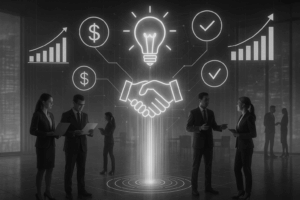Table of Contents
Introduction to Sustainable Entrepreneurship
Sustainable entrepreneurship represents a paradigm where environmental stewardship and business success intersect, creating value for stakeholders, society, and the environment simultaneously. With 73% of global consumers willing to pay more for sustainable offerings, entrepreneurs have unprecedented opportunities to build profitable businesses while making positive environmental impact.
The Rise of Green Business Models
Circular Economy Frameworks
The circular economy has emerged as a fundamental approach to sustainable business development. Unlike traditional “take-make-dispose” models, circular frameworks focus on resource optimization, waste reduction through product longevity, and closed-loop systems where waste becomes input for other processes.
Technology-Driven Sustainability
Modern sustainable businesses leverage cutting-edge technologies including Artificial Intelligence for energy optimization, IoT sensors for environmental monitoring, blockchain for supply chain transparency, and renewable energy integration for carbon-neutral operations.
Key Opportunities in Sustainable Markets
Clean Energy Sector
The renewable energy market is projected to reach $1.9 trillion by 2030. Key opportunities include solar and wind power services, energy storage solutions, smart grid technologies, and electric vehicle infrastructure development.
Sustainable Consumer Products
Growing demand for eco-friendly goods has created lucrative niches in biodegradable packaging alternatives, organic and plant-based foods, sustainable fashion using recycled materials, and green building materials for environmentally conscious construction.
Waste Management Innovation
Innovative solutions offer significant potential in recycling technologies that convert waste into resources, composting systems for organic waste, biodegradable plastic alternatives, and electronic waste recycling services addressing the rapidly expanding e-waste problem.

Successful Eco-Friendly Business Models
Product-as-a-Service (PaaS)
This model shifts from selling products to providing services, promoting extended product lifecycles through professional maintenance, reduced resource consumption via shared usage, and predictable revenue streams while offering customers lower total ownership costs.
B2B Sustainability Solutions
As businesses face pressure to achieve sustainability goals, specialized providers offer carbon footprint assessment services, sustainable supply chain optimization, green consulting for operational improvements, and environmental compliance management.
Community-Based Models
Local sustainability initiatives create strong foundations through community-supported agriculture connecting farmers with consumers, local energy cooperatives, sharing economy platforms maximizing asset utilization, and zero-waste retail stores eliminating packaging waste.
Building Your Sustainable Startup
Successful sustainable startups begin with thorough market analysis identifying specific environmental problems and validating demand through surveys and pilots. Develop comprehensive business plans integrating sustainability by defining clear environmental objectives alongside financial goals and establishing measurable impact metrics beyond traditional KPIs.
Access to capital supporting sustainable businesses is growing through impact investors prioritizing environmental returns, green bonds financing beneficial projects, government grants for clean technology, and crowdfunding platforms focusing on sustainable innovations.
Challenges and Solutions
Sustainable entrepreneurs face unique challenges including higher initial costs for eco-friendly materials, complex supply chains ensuring sustainability, consumer education about benefits, and regulatory navigation across markets. Strategic solutions include phased implementation managing costs, partnerships with sustainable suppliers, transparent communication about impact, and continuous innovation improving efficiency.
Future Outlook
The sustainable entrepreneurship landscape evolves rapidly through emerging technologies like carbon capture and precision agriculture, policy support via carbon pricing and regulations, growing consumer awareness especially among younger generations, and accelerating investment flow with ESG criteria becoming standard.
Sustainable entrepreneurship represents one of the most significant business opportunities of our time. By aligning profit motives with environmental stewardship, entrepreneurs can build resilient businesses addressing global challenges while generating substantial returns
Success lies in understanding sustainability as an innovation driver rather than constraint. The most successful sustainable businesses actively create positive environmental impact while delivering superior customer value. Early movers establishing strong eco-friendly business models will enjoy competitive advantages that become increasingly difficult to replicate.




